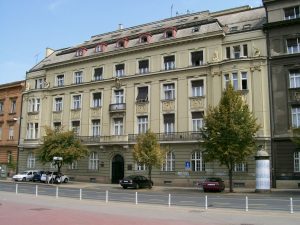Croatia has 10.7 billion EUR at its disposal in the European structural and investment funds to be spent on the implemenation of the cohesion policy .
Traditionally, Austria is one of the most important Croatian partners. This country occupies the 4th place on the list of the biggest Croatian external trade partners, says Želimir Kramarić, Vice President of the Croatian Chamber of Commerce in charge of the international and EU affairs for Diplomacy&Commerce magazine.

How much did the work in your department for cooperation with the EU affairs, funds and programmes change since Croatia’s accession into the EU?
In the pre-accession period, the Croatian Chamber of Commerce (CCC) invested huge effort into informing businesses about the changes that were about to happen with the country joining the EU mostly in the external trade, customs and tax aspects. All organizational units at the CCC also got actively involved in boosting their capacities and transferring the know-how about the conditions for doing business and financing opportunities provided by the EU funds for the member states. The Enterprise Europe Network (EEN) played a crucial role in this. There was also a need for some re-organization so we established the Department for EU Affairs, Funds and Programmes as an integral part of the Sector for International and EU Affairs whose main task was to follow EU policies and EU competitions, as well as to coordinate, apply with and implement EU projects at the CCC level.
In collaboration with other organizational units at the CCC, you have been working on representing the interests of the CCC members in EU bodies. In which areas do businesses need your support the most?
Through participation in European associations like EURATEX, ORGALIME, EURELECTRIC and EUROFISH, our Chamber’s representatives promote interests of our members at the EU level.
Member companies need our support the most in issues relating to the EU regulation which, in certain cases, is partially implemented. The fact that we are in the interim phase also poses challenges for Croatian companies. With that in mind, our members want our help with interpreting certain stipulations in the EU legislation, with meeting certain requirements or criteria stated in the EU regulation, and with obtaining information about potential business partners in the EU, the conditions for doing business and being active in a certain EU market. Also, our members are increasingly inquiring about support programmes, be it project co-financing with the funds from the EU programmes or funds, or EU financial instruments.
In which way did the membership contribute to raising the quality of bilateral cooperation with the EU members? Can you illustrate this on the example of the cooperation with Austria?
In the first eight months of 2017, Croatia exported EUR 571 million worth of goods to Austria, thus continuing a positive trend, with the exports to Austria recording an 8.1% hike. Austria is also one of the most important investors in Croatia. According to the Croatian Statistical Office, 1,237,969 Austrian tourists visited Croatia in 2016, which is a 10.6% growth relative to 2015.
In addition to tourism and greenfield and brownfield investments, the most promising sectors, which Croatian companies can participate in, are metal processing industry, electrical industry, wood processing industry, textile and footwear industry (mostly through additional processing activities) and the food industry (healthy food production).
Croatian companies from certain industries (like construction, exterior design, assembly works…) cannot operate freely in Austria as yet, i.e. they do not have the same status as companies from other “older” member states. Namely, Austria uses a limited approach to labour market for companies from certain branches in line with the 2 + 3 + 2 principle, but we are confident that the dialogue at the institutional level will eliminate this problem.
To what extent did Croatian companies accept and understand how they could use the EU funds, and what kind of support does the CCC offer in that respect?
The CCC continuously conducts education and information programmes for its members on the issue of EU tenders and opportunities for the EU co-financing entrepreneurial projects.
The CCC has formed the Department for EEN, EU Programmes and SME Support Funds which provides direct information to companies about co-financing opportunities in the EU, as well as other financing opportunities.
Given the fact that the CCC itself implements EU projects co-financed by the European Structural and Investment Funds and Union Programmes, such as the Enterprise Europe Network (EEN), companies can participate in activities and services provided by the CCC which are co-financed by the EU.

In which areas is the bilateral cooperation with Austria the most prolific?
The activities of the two chambers are focused on internationalization, especially of small and medium companies, and providing institutional support when they leave the market, as well as joint participation in EU projects and forging partnerships for their implementation. We have been collaborating with the Austrian Chamber Commerce on the ERASMUS project in the area of dual education system.
Since Croatia’s accession into the EU, the cooperation with WKO on the federal but also on the regional level, with the provincial chambers on the Austrian side, and county chambers on the Croatian side, is implemented through a series of activities such as setting up business meetings between Croatian and Austrian companies in Croatia and Austria (metal processing industry, IT sector, waste management and green technology, wood processing, textiles, etc.).
Days of Croatia 2017, the biggest presentation of Croatian economy, took place in Graz, Austria, on 25th October. How satisfied are you with this year’s participation of Croatian companies?
This year’s event in Graz, which was held under the auspices of the Croatian Deputy Prime Minister and Minister of Economy, Martina Dalić, is a positive example of the cooperation between Austrian and Croatian institutions. The CCC participated as a co-organizer of the presentation of the Virovitica-Podravina county this year. Apart from showcasing the investment, business and tourist potential and the VIROEXPO trade fair, certain Croatian companies also presented themselves and had concrete talks with a dozen potential partners from the Republic of Austria.
Austrians have been consuming Croatian wines more frequently. How much could the consolidation of Croatian wineries under a single brand, with the CCC’s support, contribute to that success?
In September this year, we presented 12 wineries from four wine regions in Croatia at the Am Hof square in Vienna, as a part of the promotion of the Vina Croatia – Vina Mosaica brand organized by the Winegrowing Association of the Croatian Chamber of Commerce. I think that consolidating wineries under the single brand would facilitate their access to these demanding markets which is the reason why we have created the Vina Croatia – Vina Mosaica brand that assembles domicile wineries with the view of helping them with joint appearance on foreign markets. In the first five months of 2017, we exported 718,500 litres of wine, more than in the entire 2016 when we exported a total of 675,000 litres to Austria.